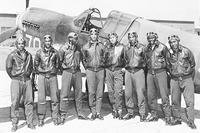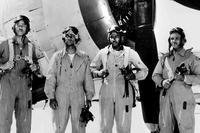Gen. Benjamin O. Davis Jr. was born Dec. 18, 1912, to the Army's first Black general, Benjamin Davis Sr. and his wife, Elnora. Davis Sr., whose career was hampered by prejudice, taught his son the evils of segregation and instilled in him a determination to see it abolished.
Davis Jr. grew up to become an Air Force general, and days before his 86th birthday, he was awarded his fourth star by President Bill Clinton on Dec. 9, 1998. He was the first Black officer to receive this honor in retirement.
The founder and commander of the Tuskegee Airmen and a 33-year veteran of three wars, Davis was "a great warrior, a great officer and a great American," Secretary of Defense William S. Cohen said when Davis received his fourth star.
Davis Jr. earned a 1932 nomination to the U.S. Military Academy from Rep. Oscar S. De Priest (R-Ill.), then America's only Black congressman.
Davis was the first Black to be admitted to the U.S. Military Academy since Reconstruction. Davis was determined to fly, but after four years of being "shunned" (spoken to only for official reasons) as West Point's only Black cadet, he found that even his standing as 35th in the 276-member Class of 1936 could not convince the Army Air Corps to allow him to enter flight training.
However, after President Franklin D. Roosevelt promoted the elder Davis to brigadier general, he ordered the Army Air Corps to create a flying organization for colored troops. Davis Jr., the only living Black West Point graduate, was ordered from Fort Benning, Georgia, to Tuskegee Army Air Field in Alabama. From the day he first pinned wings on Black pilots, Davis would see his Tuskegee Airmen swell in ranks to 1,000 and form the 99th Pursuit Squadron, later the 332d Fighter Squadron.
Although critics and early reviews reported that "the Negro type has not the proper reflexes to make a first-class fighter pilot," Davis used a combination of political diplomacy and professional action to convince detractors that his men were more qualified than some and braver than most. Their March 24, 1945, escort mission to Berlin, resulting in three direct kills and no loss of friendly bombers, is legendary.
Davis's subsequent assignments and commands were a mixed bag of personal success and cultural misunderstanding. For example, while attending the Air War College in Montgomery, Alabama, Davis and his wife, Agatha, were barred by the Color Laws from eating at most of the area restaurants. In commands in Korea and Germany, Davis's performance was so exemplary that he ended his career as deputy commander in chief of the U.S. Air Force. After retiring in 1970, he served as an assistant secretary at the Department of Transportation under President Richard M. Nixon.
Davis died in 2002 at age 89.
Want to Know More About the Military?
Be sure to get the latest news about the U.S. military, as well as critical info about how to join and all the benefits of service. Subscribe to Military.com and receive customized updates delivered straight to your inbox.



















